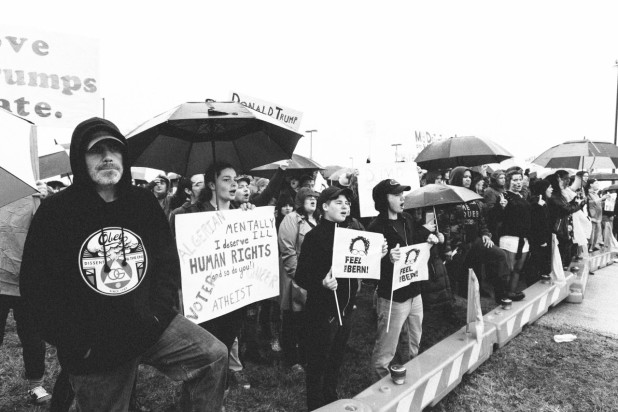Atlantic Centurion
April 21, 2016
The economic ideology of the average liberal voter in the United States is best summed up as free shit. This is similar to, but distinct from, the overall message of equality through state intervention, but of a much lower-order impulse than sophist racial and gender ideologies. It is quite simply a politics of envy and resentment. Wanting more money to buy dildos, or any inherently meaningless consumer good, is not a tenable political position.
There is a good amount of talk about poor people and working-class people in this country by the Democratic candidates, and indeed these people do exist and do have the right to vote (and therefore the potential to be farmed for votes). These people are promised benefits paid for by the expropriated wealth of others, to be administered by yet another third party—the free shit. The justification, purportedly fairness and equality, legitimizes the use of state power to redistribute wealth to those in poverty. But really, what is poverty in the wealthiest society the wide world over has ever known? Why do they deserve free shit? This requires us to dig deeper into the idea of poverty itself.
In short, we have two kinds of poverty, absolute and relative. Sometimes there are monetary definitions given for each of these, but we can essentially infer those; absolute will be lower than relative. Absolute poverty is a condition that will not change based on your peers and resources; relative poverty will. The absolute poor barely meet their needs, if at all. They live in hunger and squalor and filth, they own little in the way of property, they either rent or squat in barely livable conditions, they suffer disproportionately from illnesses both ordinary and severe, you get the idea. It is almost unheard of in the United States.
Relative poverty borders on ironic in this country, because it includes people who would be kangz in Haiti, Burundi, or even Egypt itself for those at the upper ranges. It includes people whose access to food is enough to make them obese, whose access to welfare is enough that they can pay their rents, and whose access to credit is enough that they can bankrupt themselves buying frivolities. If you eat more than two meals a day, you are part of the global rich. And these people can eat.
And more generally, they consume. They consume much of the wealth they have; that’s one of the major reasons they are poor (and here poor means not as wealthy as those living more comfortable lives). Low wages are one reason for this bad balance sheet. If their labor was more productive, they would of course have a higher wage. If they produced more, they would be able to consume more. Liberals want to raise their wages so they can consume more without producing more, which is in some ways similar to the ledger sorcery of debt financing.
But what cannot be overlooked as a factor is the high time preference of the relative poor. They do not like to save money, or plan for the future (which are nearly synonymous). Some ((((sociologists)))) will argue that this is due to muh oppression; they couldn’t save if they wanted to. But ask anyone who has been socially mobile how they did it and I guarantee you it involves aspiring to a future state and then doing whatever it takes to get there, making sacrifices, and working hard.
One of the most popular ideologies among college-educated Millennials, many of whom have been consumers their entire lives, is some variation of socialism. If they identify with Senator ((((Bernie Sanders)))), it is democratic socialism, his euphemism for special snowflake marxism. It is a bourgeois movement that claims to speak on behalf of the poor, the overwhelmingly relative poor, and like all forms of left-wing social policy will disincentivize people to work and burden the productive. Sandernistas feel bad that they don’t have high-wage jobs that let them buy frivolous shit, and they project this on to the relative poor, who require little provocation towards hating the wealthy. And there are plenty of reasons to hate the wealthy of this country which are contextual and not categorical. The Trumpist hates them for treason to the nation; the Sandernista hates their class for its wealth. Muh surplus labor wuz stolen and sheit.
But back to the resentment politics and linguistic gymnastics of poverty. Are these people genuinely impoverished to the point of suffering and destruction? Certainly not if they are breeding and feeding. And certainly not the White oven-middle-class support base of Sanders, who, if they are poor, are poor by their own efforts—debt incurred from a private liberal arts education or the cost of living as a professional tourist in someone else’s city. What they lack is time preference and capital. They feel anger at “capitalism,” which has produced all kinds of things useful, marvelous, and degenerate, which they cannot afford, because they did not produce enough to acquire them. They do not need these things to live or have an enjoyable life; it is just that other people have nice things. The eternal cry of gibsmedat shall ring so long as the franchise is unlimited, because the haves have always been dwarfed by the have-nots.
I don’t hate the poor, especially if they are of my tribe. I want my people to succeed, and to work for it. The situation in the United States is such that redistribution is racial and the beneficiaries are disproportionately non-White. I will not freely consent to subsidizing my demographic displacement; and it is becoming increasingly hard to vote our way out.
Societies all around the world invest more in welfare and education when they are more homogeneous. There’s a reason Denmark is considered the model social-democratic country: because Danes like helping their extended family. The United States is an ethnographic kaleidoscope in which peoples often self-segregate and vote based on their race. “The poor” are thus an inherent other, to all races. It becomes highly contextual to what your city or state is like. You cannot wish these behaviors or attitudes away, not any more than you can wish away the behavioral causes of relative poverty, such as high time preference, a lack of future orientation, a propensity to consume, laziness, etc.
Don’t be mad that capitalism produces things you can’t afford like the latest smartphone or dragon dildo, even though you are fed and have a roof overhead. Be happy you aren’t dead at 37 and buried in a sackcloth.
 Daily Stormer The Most Censored Publication in History
Daily Stormer The Most Censored Publication in History



